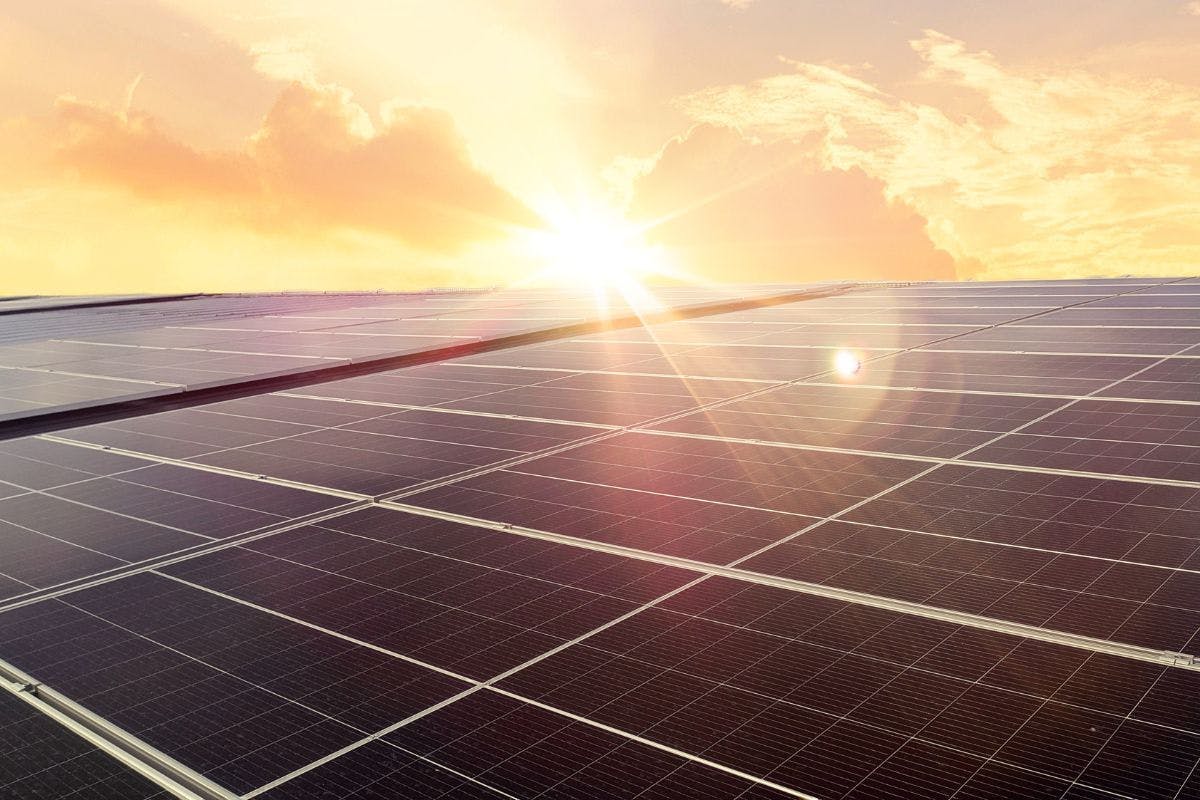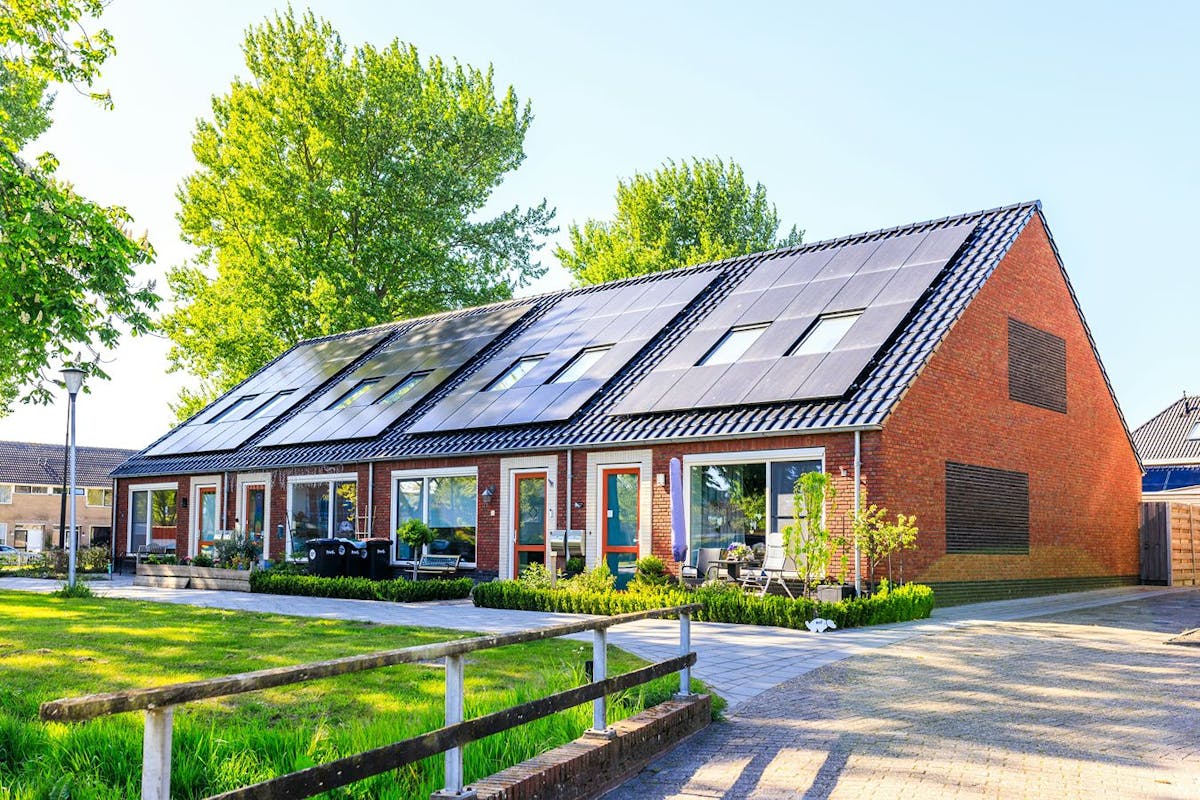Solar Energy Pros and Cons: When Solar Is Right for You
Last edited
Author
Andrew Giermak
Solar and Electrification Writer and Editor
Editor
Andrew Blok
Electrification and Solar Writer and Editor

Home solar panels are reaching the mainstream because they can deliver savings to a wide range of homes. With over five million solar installations, residential solar is delivering benefits to a lot of households.
While many homes can benefit from solar panels, that’s not always the case. Here are the pros and cons of residential solar panels, and some guidance on whether solar panels fit your needs. The best way to understand how solar panels could benefit you is to get a quote from a reliable solar company.
See how much you can save by going solar with Palmetto
Solar energy pros
The main benefits of solar include cost savings, but there are plenty of others to consider.
1. Solar can reduce or eliminate your utility bill
We use electricity to cook, cool our living spaces, and power critical devices, including necessary health devices and vehicles.
As our reliance on electricity increases, so does the monthly cost. Reducing electricity consumption to lower your monthly bills is a fine idea, but only goes so far.
Solar energy can reduce your electricity costs by meeting all or part of your electricity needs. Many people go solar and realize savings without changing their lifestyle. It can feel like you have it all.

2. Solar power can increase the value of your home
A house with lower bills can be more valuable to potential buyers. Research by Zillow shows installing solar panels can increase your home's value by up to 4.1%.
Industry research indicates buyers will pay more for a house with solar energy for two key reasons. First, it allows them to take advantage of work that’s already been done to enjoy a solar power system that suits the home’s needs. Second, solar power helps keep monthly utility bills low after they move in.
3. Home solar combats rising energy costs
Electricity prices rose sharply in places over the last few years. According to the US Energy Information Administration (EIA), residential electricity prices are projected to rise through at least 2026.
Installing a solar power system is one of the best ways to combat this continued rise in the price of electricity. Palmetto estimates that customers in Connecticut who lease solar panels effectively saved a collective $463,000 in additional avoided costs.
Other than the initial price of installation, you will typically incur only a few other costs during the lifetime of your panels for things like routine annual maintenance. The expected lifetime of solar panels is 25 years or longer.
4. Solar reduces your carbon footprint
Greenhouse gases (mostly from burning fossil fuels) cause global warming and climate change. To avoid their worst effects, we need to reduce greenhouse gas emissions. Solar panels can reduce your carbon footprint at home.
On a larger scale, solar electricity has one of the lowest carbon intensities of any energy source.

Lifetime greenhouse gas emissions by electricity generation source. Credit: NREL
5. Save and get paid for solar power production
Depending on your location, you may earn additional bill credits when you share energy with the grid or earn money when you sell renewable energy certificates.
Net metering: In some areas net energy metering (NEM) earns you credits on your electricity bill when you send power from your panels to the grid.
Solar renewable energy certificates: Depending on where you live, you can earn one renewable energy certificate or solar renewable energy certificate (SREC) for every 1,000 kilowatt-hours (kWhs) of electricity your system produces, which you can sell on an SREC marketplace. This can be an important part of your solar savings.
See how much you can save by going solar with Palmetto
6. Solar power is surprisingly affordable
When looking at solar panels, a decision usually comes down to one metric: Are the benefits of going solar worth the cost?
When you purchase solar panels, you incur the bulk of your costs during installation. The cost of solar panels is significantly lower than it was a decade ago. The loss of the solar tax credit for homeowners raises the cost of purchasing solar, but rising electricity prices mean it can still be worth it to purchase panels.
With a solar lease, you incur zero upfront costs and can start saving as soon as your panels are switched on. Solar leases, and their close relative, power purchase agreements, already make up a significant portion of all residential solar installations and will continue to be increasingly valuable as costs rise for homeowners.

Credit: SEIA
On average, solar panels can pay for themselves in 6-10 years. Once the solar power system has been paid off, you’ll enjoy years of clean energy generation with no additional payments.
7. Solar benefits the whole electricity grid
As electricity demand increases, it strains grids. That can lead to less reliable service and higher prices.
Residential solar can help address these challenges. Palmetto recently found its installations in Florida generated enough clean energy to offset 9% of estimated data center demand in the state.
With increased panel efficiency, dramatically reduced costs of batteries, and smart grid integration opportunities, solar power and battery storage systems can both reduce costs for homeowners and support the grid.
8. Solar power systems have a long lifespan
Solar panels can deliver reliable service and savings for 25 years and more.
Panels have no moving parts and little risk of wear and tear, so maintenance requirements are typically low.
Even with a gradual, but natural, reduction in efficiency, solar panels can still produce electricity beyond 25 years. It may be worth it to install a new system at that point, but old panels will still be able to generate electricity.
9. Solar supports the local economy
According to the Interstate Renewable Energy Council, the solar energy sector employs more than 280,000 people in the US.
See what solar can do for you:
Solar energy cons
While the numerous benefits of solar power are exciting, it’s important to acknowledge when it may not be the right fit for all cases.
1. Purchasing solar panels can be costly
Solar panels often save more money than they cost over their lifetime, up to tens of thousands of dollars. Still, the cost of purchasing and installing them can be a barrier for some people.
Solar leases and power purchase agreements (PPAs) offer an alternative to buying solar that still can deliver savings. Both options see you get solar panels installed at your home for no upfront cost. Instead, you pay a monthly fee for the equipment or the power it produces. When those payments are less than the amount you save on your electricity bill, you save money overall.
Palmetto’s lease and PPA offering, the LightReach Energy Plan, offers proactive monitoring and buy-out opportunities, includes service and maintenance, and extends a performance guarantee.

2. Solar power is a long-term commitment
Whether you’re looking to hit your payback period with a purchased system or rack up big savings with a leased one, both take time. The estimated payback period for purchased panels is often estimated at around a decade, though it can be longer or shorter depending on the case. Ideally, you’d be in your house long enough to enjoy the savings after the payback period is reached. Luckily, if you sell your home before that, solar panels could raise the value of your home.
3. The process can be confusing
Most people aren’t experts in residential solar installation. That makes finding the right company to partner with very important. Look for:
- Experience in the industry
- Customer reviews and ratings
- Ease of speaking with customer service
- Quality of solar panels and components
- Length of product and workmanship warranties
4. Calculating the financial benefits of solar can be challenging
Reducing or eliminating utility costs is a key part of deciding if you should go solar. The high initial cost of installation can feel steep, even as you estimate long-term savings will offset them and lower your electricity bills.
That’s the benefit of using the Palmetto solar savings tool. It automatically uses the most important variables to give you a good estimate of your savings with solar power.
Common misconceptions about solar energy
Solar panels can help you access clean, affordable energy that can lower your electric bill and insulate you against rising energy costs. Even so, a few misconceptions persist.
- Required maintenance: In reality, solar energy systems require very little maintenance.
- HOA restrictions: In many states, it is illegal for a Homeowners Association to deny a solar energy installation due to local aesthetic concerns.
- Roof damage: When installed by a certified professional like Palmetto, solar panel installations do not create leaks or roof damage.
Curious about how solar panels will work for your home?
Another way to learn about saving money by saving energy, and by going solar, is with the new Palmetto app.
See what solar can do for you:
Solar pros and cons FAQs
How do I know if solar is right for me?
There are several factors we look at to determine if solar is likely a good solution for your needs, including roof space, home energy usage, credit health, and eligibility for incentives. Getting a quote for solar panels at your home is the best way to gauge.
Can solar panels save you money?
Solar panels can save homeowners money. The local cost of solar panels and retail electricity, as well as what incentives are available to you, help determine solar savings in a particular area.
Disclaimer: This content is for educational purposes only. Palmetto does not provide tax, legal, or accounting advice. Please consult your own tax, legal, and accounting advisors.


